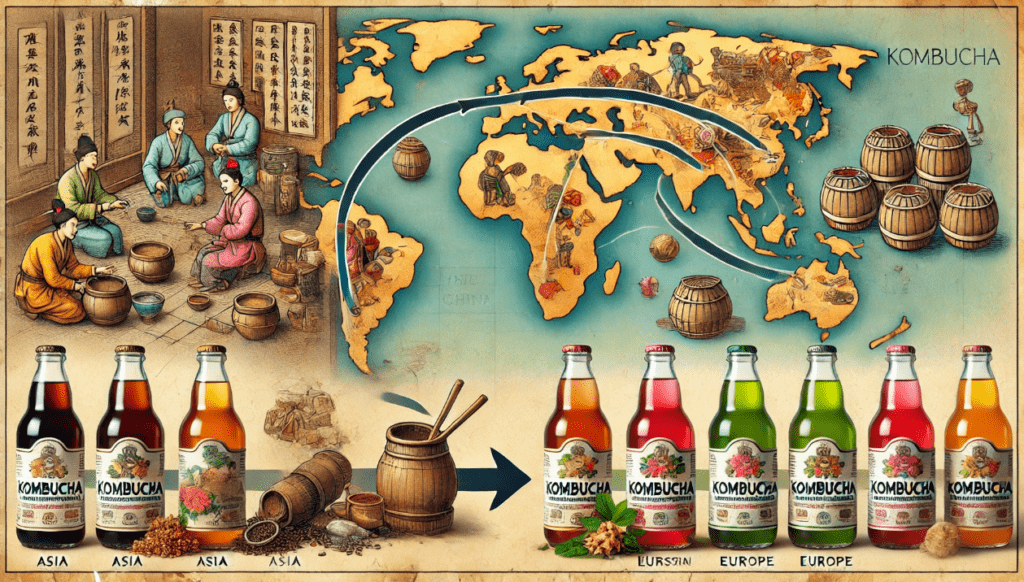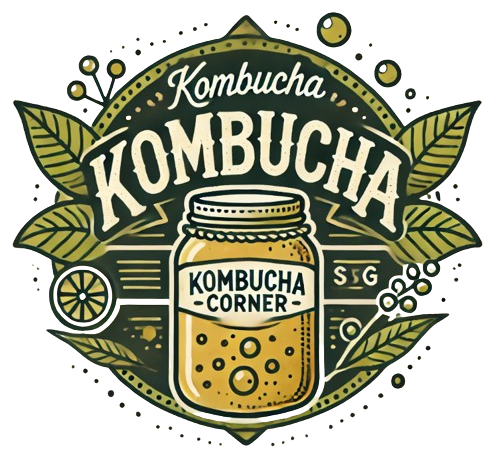Unveiling the Kombucha Origin: A Deep Dive into Its Ancient Roots and Modern Revival
Introduction Kombucha, the fermented tea beverage that has taken the wellness world by storm, has a history as rich and complex as…
Introduction
Kombucha, the fermented tea beverage that has taken the wellness world by storm, has a history as rich and complex as its flavor. But where did kombucha originate, and what are the potential benefits and challenges associated with its consumption today? In this article, we’ll explore the kombucha origin, its spread across the globe, and the modern scientific scrutiny that this ancient elixir has attracted.

The Ancient Origins of Kombucha
The kombucha origin can be traced back over 2,000 years to Northeast China, during the Qin Dynasty around 220 BCE. Known as the “Tea of Immortality,” kombucha was highly prized for its supposed health benefits, particularly its potential to promote longevity and vitality. This tangy, effervescent drink is made by fermenting sweetened tea with a symbiotic culture of bacteria and yeast (SCOBY), which converts sugars into organic acids, gases, and alcohol.
The name “kombucha” is believed to have Japanese origins, though this is somewhat controversial. Historically, the term referred to a seaweed tea in Japan. The association of the name with the fermented tea beverage we know today is likely the result of a misnomer by Westerners in the 20th century. Despite this confusion, kombucha’s roots in Asia laid the groundwork for its spread across the world [source].

The Spread of Kombucha Across Asia and Europe
As trade routes expanded, kombucha began to spread beyond China. Below is a timeline that traces the journey of kombucha from its ancient beginnings to its modern-day popularity:
Kombucha Timeline:
- 220 BCE: Kombucha is believed to have originated in Northeast China during the Qin Dynasty, where it was consumed as a health tonic known as the “Tea of Immortality.”
- 414 AD: According to legend, Dr. Kombu, a Korean physician, introduced kombucha to Japan. Although there is no historical evidence to confirm this story, it’s a popular part of kombucha folklore. The drink was said to have been adopted by Samurai warriors, who believed it provided energy and vitality before battle.
- 16th Century: Kombucha likely spread to Korea, where it became part of traditional medicine practices.
- Early 20th Century: Kombucha reached Russia through the Silk Road, becoming known as “tea kvass.” It gained popularity during times of scarcity, such as World War I, due to its simple brewing process and perceived health benefits.
- 1920s-1930s: The drink spread across Eastern Europe, including Poland and Germany, where it was integrated into local health practices and folk medicine.
- 1960s-1970s: Kombucha experienced a resurgence in the West, particularly in the United States, aligning with the health food and counterculture movements.
- 1990s: Kombucha became commercially available, leading to its modern-day popularity as a health-conscious beverage found in stores worldwide.
This timeline showcases kombucha’s global journey, highlighting key historical moments and cultural integrations that shaped its evolution [source].
The Legend of Dr. Kombu: Myth or Reality?
One of the most intriguing stories in kombucha’s history is the legend of Dr. Kombu, a Korean physician who is said to have introduced the beverage to Japan around 414 AD. According to this tale, Dr. Kombu brought the fermented tea to Japan as a health remedy for the Japanese emperor. Over time, kombucha became associated with Samurai warriors, who believed it provided them with energy and vitality before battle.
However, this story is more folklore than fact. The name “Kombu” may be linked to the Japanese word for kelp, which has caused confusion, as “kombucha” in Japan traditionally refers to a different drink made from kelp tea. There is no concrete historical evidence to confirm the existence of Dr. Kombu or his role in spreading kombucha. Instead, this tale has been passed down through generations, becoming part of the rich tapestry of kombucha mythology.
While the story of Dr. Kombu adds color and intrigue to the history of kombucha, it’s important to recognize it as part of the beverage’s folklore rather than a verified historical event.

Kombucha’s Role in Modern Health Movements
Kombucha’s origin dates back over 2,000 years, but its popularity waned during the early 20th century due to global conflicts that made tea and sugar scarce. However, the 1960s and 1970s saw a revival of interest, particularly in the West, where kombucha was rediscovered by those involved in the counterculture and health food movements. The drink was marketed as a natural, probiotic-rich beverage, aligning perfectly with the era’s emphasis on natural and holistic health practices.

The Influence of Sally Fallon and “Nourishing Traditions”
One of the pivotal figures in the modern revival of kombucha, and fermented foods in general, was Sally Fallon. In her influential book Nourishing Traditions, first published in 1999, Fallon advocated for a return to traditional diets rich in fermented foods—like kombucha—that were common in the diets of our ancestors. She emphasized the importance of these foods for optimal health, linking them back to the traditional practices observed in the kombucha origin story.
Fallon’s book played a crucial role in reintroducing kombucha to a new generation, positioning it as part of a broader movement toward traditional, nutrient-dense diets. Nourishing Traditions explored the health benefits of kombucha, particularly its probiotic content, and encouraged readers to brew their own kombucha at home. This grassroots approach resonated with the growing interest in natural health and DIY food preparation, significantly contributing to the modern resurgence of kombucha.
The influence of Sally Fallon and her work laid the groundwork for kombucha’s widespread popularity today. As people began to rediscover the value of fermented foods, kombucha quickly became a symbol of the broader health food movement, leading to the rise of popular brands like GT’s Kombucha in the 1990s. Fallon’s advocacy ensured that the kombucha origin story was not just remembered, but celebrated as part of a broader return to ancestral health practices.
For those interested in exploring the impact of fermented foods further, Fallon’s book Nourishing Traditions is a must-read and is available on Amazon.
Scientific Studies on Kombucha
The growing popularity of kombucha has led to increased scientific interest. Research has focused on its potential health benefits, such as its probiotic content, antioxidant properties, and its ability to aid digestion.
- Probiotic Content: Studies have shown that kombucha contains beneficial microbes like Lactobacillus and Acetobacter, which contribute to its potential digestive health benefits [source].
- Antioxidant Properties: Kombucha has been found to have significant antioxidant activity, which could help in reducing oxidative stress and protecting cells from damage [source].

However, while some studies show promising results, particularly in animal models, there is still a need for more rigorous, human-based research to fully substantiate these claims. The dual nature of kombucha—its ancient roots as a health beverage and the modern-day challenges associated with its consumption—make it a subject of ongoing scientific inquiry [source].
Common Myths and Misconceptions
While kombucha is often marketed as a cure-all, it’s essential to address some of the myths surrounding it. For instance, claims that kombucha can cure cancer or detoxify the body have not been supported by scientific evidence. Instead, kombucha should be seen as a healthful addition to the diet rather than a miracle cure. Ensuring that readers understand the difference between traditional beliefs and scientific evidence will help them make informed choices.
Health Benefits and Risks of Kombucha

While kombucha is often praised for its health benefits, it also presents certain risks. The study “Kombucha: Challenges for Health and Mental Health” discusses how kombucha can support gut health and potentially improve mental well-being due to its probiotic nature. However, it also highlights the risks associated with improper brewing practices, contamination, and overconsumption, which can lead to adverse effects on both physical and mental health [source]. We have another article title Exploring Health Benefits of Kombucha which might interest you.
FAQ: Addressing Common Concerns
- Is kombucha safe during pregnancy? While kombucha contains probiotics, it also contains alcohol and caffeine, which may not be recommended during pregnancy. It’s best to consult a healthcare provider.
- How much kombucha should I drink? Moderation is key. Start with small amounts to see how your body reacts. Overconsumption can lead to digestive issues or, in rare cases, lactic acidosis.
- Can I brew kombucha at home? Yes, but it requires careful attention to cleanliness and brewing conditions to avoid contamination. Use quality ingredients and follow trusted recipes.
Conclusion: The Enduring Legacy of Kombucha

From its origins in ancient China to its global popularity today, kombucha has proven to be more than just a passing trend. Whether valued as a health tonic, a refreshing beverage, or a cultural staple, kombucha has woven itself into the fabric of many societies around the world. Thanks in part to advocates like Sally Fallon, kombucha’s reputation as a health-promoting beverage has been solidified in the modern era. As research continues to explore its potential benefits, kombucha’s popularity is likely to keep growing, ensuring its place in our kitchens—and our hearts—for years to come.






